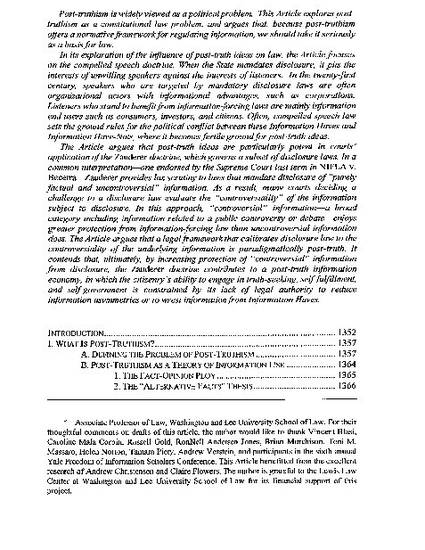
Post-truthism is widely understood as a political problem. In this Article, I argue that post-truthism also presents a constitutional law problem—not a hypothetical concern, but a current influence on First Amendment law. Post-truthism, which teaches that evidence-based reasoning lacks value, offers a normative framework for regulating information. Although post-truthism has become a popular culture trope, I argue that we should take it seriously as a theory of decision making and information use, and as a basis for law.
This Article uses the example of compelled speech to explore how post-truth rhetoric and values are being integrated into law. When the State compels speech, it pits the interests of speakers, mostly organizational actors with informational advantages, against those of listeners—mainly information end-users such as consumers, investors, and citizens. Because, increasingly, compelled speech law sets the ground rules for this political conflict between information-haves and information have-nots, it is fertile ground for post-truth ideas. It is therefore unsurprising to find compelled speech doctrines easing and restricting the flow of disclosures in ways that conform to post-truth ideas about what sorts of information people should use to make decisions.
An example is the Zauderer doctrine, which calls for lax scrutiny of laws mandating disclosure of “uncontroversial” commercial information, and higher scrutiny of laws mandating disclosure of “controversial” information. Another is the government-filtering preference—a claim that, in compelled-speech cases, the State, not a private actor, must communicate particularly sensitive private-actor disclosures to the public. The Supreme Court endorsed both of these in its most recent compelled speech case, NIFLA v. Becerra. I show that controversiality tests and government-filtering preferences subvert core First Amendment principles and, by cutting off access to information or reducing its credibility, contribute to a post-truth information economy, in which the public’s ability to engage in truth-seeking, self-fulfillment, and self-government is constrained by its inability to obtain useful, trustworthy information at all.
